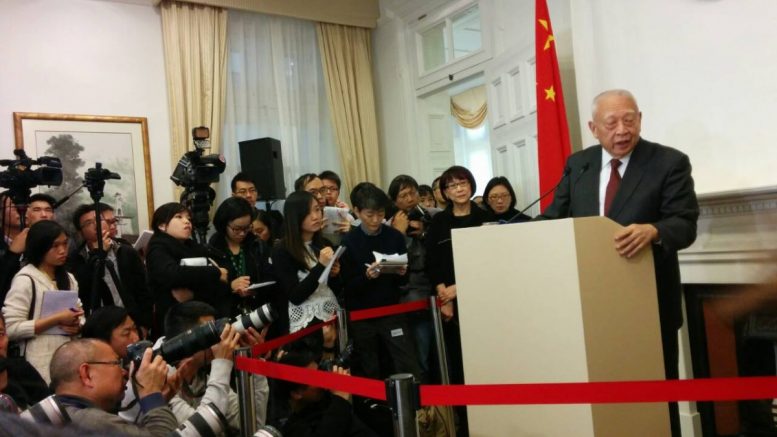By Chris Yeung –
Speaking as if he was a fan of the British colonial rule, Tung Chee-hwa yesterday lamented the post-handover government led by three chief executives including him has failed to do as good as the pre-handover administration.
“Since the handover,” he said, “the chief executives have had difficulty implementing an executive-led government model, which was effectively implemented before the handover. As a result, past administrations have been unable to achieve what they aspired to.”
The city’s first chief executive attributed the failure to the fact that he and his two successors do not lead any political parties and that lawmakers are popularly elected, representing different interests.
Tung, founder of the Our Hong Kong Foundation, called on the government to work “even closer with the pro-establishment camp, build a closer partnership relationship and allow them to get more involved in the implementation and discussion of government policies.” For the opposition, he urged them to be “rational and constructive”, adding the government should strengthen communication with the public.
As Tung lamented the failure of the executive authorities to lead after the handover, the dilemma faced by education minister Eddie Ng Hak-kim at a Legislative Council panel meeting on a HK$1 billion-mark “Belt and Road” scholarship fund has shed more light on the governance failure.
Loyalists reticent, pan-democrats against
At the panel meeting, all pan-democrats opposed the funding, branding it as a move by Leung to “lick the boots of the Chinese Communist Party”. They questioned whether it was after all a campaign by Leung to please Beijing for their blessing for his second term. People Power’s Wong Yuk-man has warned of filibustering of the funding proposal.
Fearful of the potential damage to their upcoming Legco election, the pro-establishment camp has been reticent about the scholarship scheme.
Starry Lee Wai-king, chairwoman of the pro-government flagship Democratic Alliance for the Betterment and Progress of Hong Kong, said although they support the “spirit” behind the scholarship they must evaluate carefully in view of the dissenting views in the society.
In what could be interpreted as a “no” to the plan, she suggested the government to re-deploy “internal resources” for the scheme.
Lee’s remarks are in line with a more explicit call on Saturday by Tsang Yok-sing, former DAB chairman and Lee’s mentor, for the government to “reconsider the urgency” to pass the proposal.
Tsang spoke one day after Leung urged lawmakers to approve the money quickly after he returned from an overseas trip on Friday. Speculation was rife that Leung was eagerly keen to secure an approval of the plan before the current Legco session ends in July.
Tung was speaking the obvious when he said the chief executive does not lead any political party. This is because of a provisions under the chief executive election law, enacted during his administration, that bans the chief executive for having affiliations with political parties. The Basic Law does not have such a requirement.
The development of elective politics has brought immense difficulty for the government to govern as they wish. Like it or not, they have to heed public opinion, which is at times volatile.
Lesson of Article 23 fiasco forgotten, or never learned
Gone are the days when the Government could bulldoze policies and bills by securing enough votes from their so-called “loyalists” irregardless of public opinion. The humiliating back-down of the national security bill in 2003 is a painful lesson.
The Leung administration seems to have forgotten the lesson if they bend on railroading the “Belt and Road” scholarship in the face of the depth of opposition and doubts about the plan.
People may feel OK to give the benefit of doubt about the government rhetoric of the significance of “Belt and Road” strategy to Hong Kong’s long-term development. But when it comes to a funding in the tune of HK1 billion from their pocket, their questions about its justification, feasibility and supervision cannot be ignored.
Much has been said and blame apportioned about the deficiencies of the political structure behind the governance conundrum the administration under three chief executives encountered. True as they are, policies that are hastily-made and, worse, politically-driven, without rigorous and rational analysis have aggravated the governance problem. And it could only be a pipe dream for any executive authorities to believe they would be able to lead with bad and erroneous policies.
Chris Yeung is founder and editor of the Voice of Hong Kong website. He is a veteran journalist formerly worked with the South China Morning Post and the Hong Kong Economic Journal. He writes on Greater China issues.
Photo: Picture taken from DBC website


Be the first to comment on "‘Belt’ scholarship plan sheds light on ‘executive-led’ model failure"